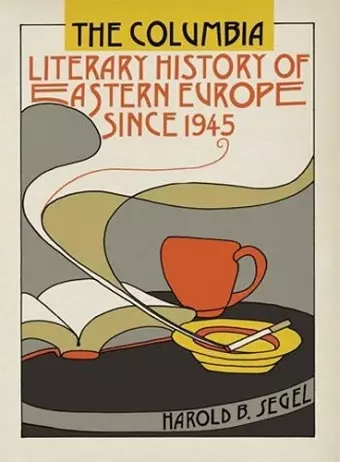The Columbia Literary History of Eastern Europe Since 1945
Format:Hardback
Publisher:Columbia University Press
Published:16th May '08
Currently unavailable, and unfortunately no date known when it will be back

The story of Eastern Europe since the end of the Second World War is a phoenix rising from the ashes, in a thousand forms with a dozen tongues, being enslaved by liberators and then disillusioned with liberation. This remarkable volume, with its great diversity of literatures and languages (thirteen of them), can be seen as a companion to Harold B. Segel's Columbia Guide to the Literatures of Eastern Europe since 1945. Part history, part biography, part primary text, its stories spread out in all directions with no definable main heroes but with a number of common themes: dictators, fleeing outward, fleeing inward; totalitarianism becoming postmodernism without a breathing space. In its panoptic scope and fine-grained detail, it reminds one of War and Peace, but peopled entirely by witnesses who believed in the power of the word. -- Caryl Emerson, Princeton University This volume could only have been written by Harold B. Segel, who demonstrates his dazzling erudition in a comprehensive account of the literatures of communist Eastern Europe. Sweeping across the entire region, with its numerous national languages and cultures, Segel offers a whole new history of communism told through its literary manifestations. Written with powerful insight and tremendous academic mastery, this book will be indispensable-both as a narrative and as a reference-for anyone interested in understanding the dynamics of culture and communism in Eastern Europe in the twentieth century. -- Larry Wolff, New York University, and author of Inventing Eastern Europe: The Map of Civilization on the Mind of the Enlightenment Without a doubt Harold B. Segel's Columbia Literary History of Eastern Europe Since 1945 is a substantial contribution to the field of Eastern European literature. I know of no other reference that approaches the nature or of the scope of this book. -- Charles S. Kraszewski, editor in chief, Polish Review, and author of Great Souls and Grey Men: The Romantic Hero and Contemporary Anti-Hero in Polish and Czech Literature
Covering a range of countries - Albania, Bosnia-Herzegovina, Bulgaria, Croatia, the Czech Republic, East Germany, Hungary, Lithuania, Macedonia, Poland, Romania, Serbia, Slovakia, Slovenia, and the Ukraine - this title presents history of Eastern European literature.Covering Albania, Bosnia-Herzegovina, Bulgaria, Croatia, the Czech Republic, East Germany, Hungary, Lithuania, Macedonia, Poland, Romania, Serbia, Slovakia, Slovenia, and Ukraine, Harold B. Segel, a longtime scholar of Slavic literatures and of comparative literature, writes a clear, concise, and balanced history of Eastern European literature. Segel not only examines the literary response to the quasi-colonial oppression that stretched across Eastern Europe between 1945 and 1991 but also details the impact of the downfall of communism and the way in which the challenges of the postcommunist period are being met. Segel's history follows a unique chronological-topical approach that begins with the treatment of World War II in Eastern European fiction and follows with such topics as the postwar imposition of Soviet-style literary controls, primarily in the form of socialist realism; literary responses to the brutal campaign of collectivization after 1945; the impact of the death of Stalin and expectations of change; exile and creativity; strategies of literary evasion and subterfuge; writing born from the experience of prison and labor camps; and the rise of solidarity in Poland. He also handles varieties of postmodernism throughout the region; poetry by women and the continued struggle for freedom of expression; the resonance of the Yugoslav wars of the 1990s on imaginative literature; Eastern European writers and their relationship to America; and the major postcommunist trends of new urbanism, nostalgia, emigration, and minority concerns.
An excellent resource for Slavic literature scholars and librarians alike. -- Terri Tickle Miller American Reference Books Annual
ISBN: 9780231133067
Dimensions: unknown
Weight: unknown
424 pages